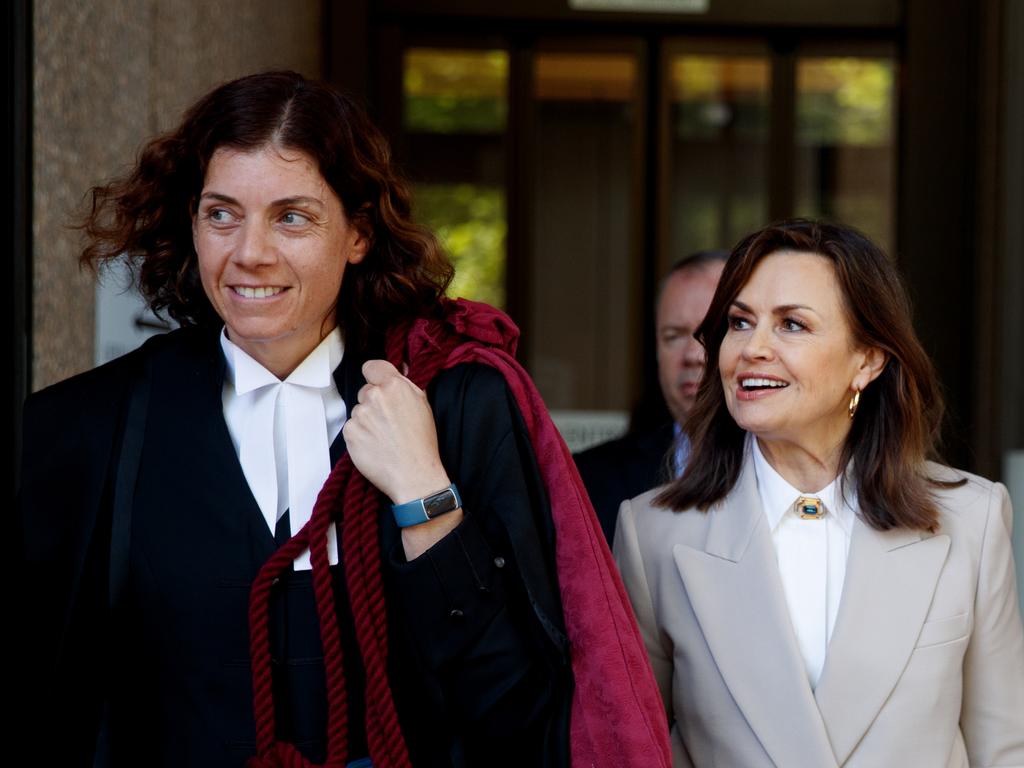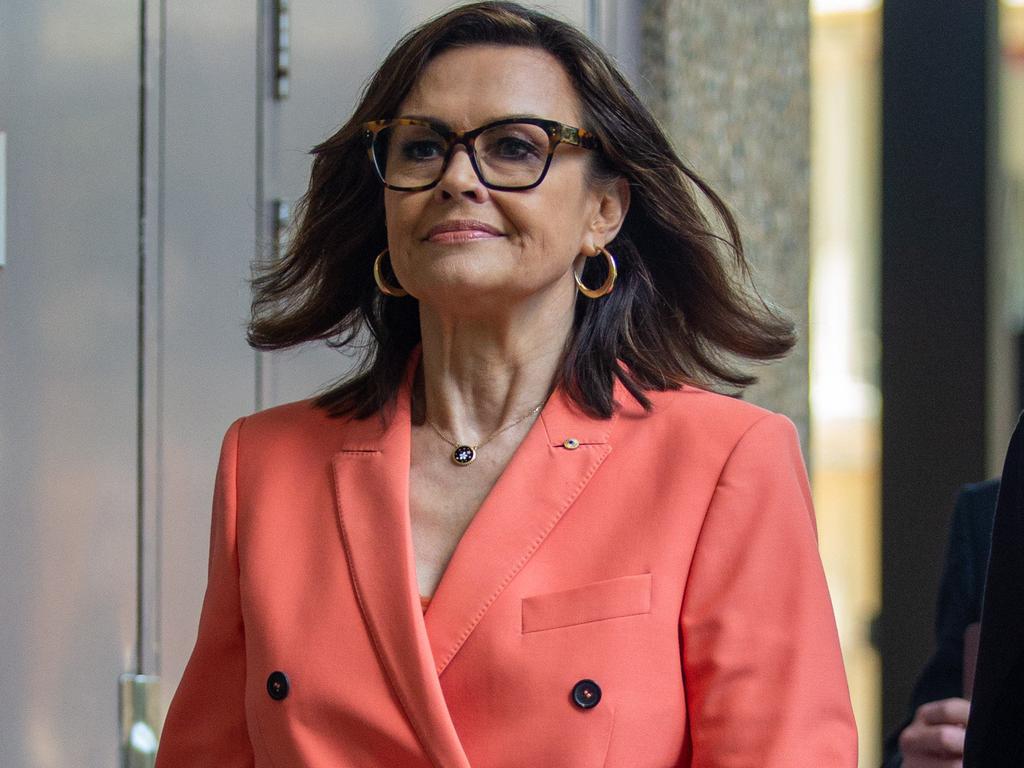You can’t make this up. Lisa Wilkinson must be from Mars


Her interview with Brittany Higgins crucified Linda Reynolds’ chief of staff Fiona Brown, portraying her as an uncaring Liberal Party hack who, it seemed to suggest, helped cover up the rape of a young woman for political convenience.
Yet in the witness box at Bruce Lehrmann’s defamation trial this week, Wilkinson has claimed The Project portrayed Brown as a “caring” person and was “complimentary” of her.
That will be news to anyone who watched the program, and certainly news to Brown herself, whose life was turned upside down by the unproven - and almost entirely unchallenged - allegations levelled against her after a lifetime of distinguished public service.
The Project gave Brown a starring role as a chief villain – second only to the alleged rapist – in the story Higgins told. But Lehrmann wasn’t named in the program. Brown was.
Higgins claimed that she told Brown in their first meeting she had been raped in Reynolds’ office; that Brown had viewed the CCTV footage from that night but refused to let Higgins see it; that Brown had not supported Higgins after that night, and in fact offered Higgins a “payout” to get her out of the way in the lead up to the election.
“It was like standing in front of a firing squad”, Brown recalled in an interview with The Australian earlier this year. “And it was the day that my life ended, as I knew it.”
“The worst thing you can say about a woman is she walked past another woman’s rape,” Brown says.
None of it was true, she says. But her world fell apart. Colleagues shunned her.
At one point not long after, she walked into the sea in a bid to end it all, saved by a caring young surfer who took her by the hand and pulled her back to shore.
Brown has been left so traumatised she has asked to be excused on medical grounds from giving evidence in the defamation case. Justice Michael Lee has yet to rule on whether she will be required to testify.
Wilkinson and her colleagues are trying to prove they acted reasonably and in the public interest in the way they handled Higgins’ rape allegations.
The TV veteran might have used her two days in the witness box to clear up some of the misreporting around the case.
Instead, Wilkinson doubled down on her claims that Brown was part of a conspiracy to cover up a hideous crime - “taking orders from the Prime Minister’s office” - while simultaneously claiming she had been “nice” to Brown in the program.
The Sofronoff Inquiry completely debunked the idea there was some kind of political conspiracy to bury the rape claim but Higgins and Wilkinson have clung to it like a liferaft through this trial.
A somewhat puzzled Justice Lee pointed out that Brown had arranged a meeting for Higgins with the AFP, and had taken her down to AFP offices.
Lee: “Do you think it’s consistent with a systemic cover up of a rape allegation for someone to escort someone to an AFP office?”
Wilkinson: “I think if Ms Brown had been properly trained in dealing with a survivor of sexual assault, the internal AFP would not have been a place to take them.”
So now Brown is being condemned for taking Higgins to the police.
You couldn’t make it up.

“You’d agree that it would be wicked conduct … being involved in the systemic cover up of a rape allegation?” Lee asked.
“Yeah, it was about keeping the details away from the media,” Wilkinson said, before retreating to her claim that Brown should have been happy with her treatment at the hands of The Project.
Wilkinson wouldn’t concede that any of the allegations in the show were even critical of Brown.
She rejected the idea that viewers would have been left with the impression that Brown applied pressure on Higgins not to go to the police.
Not at all. When she began the program by stating that Higgins was “forced to choose between her career and the pursuit of justice” she hadn’t meant the young woman had been pressured by Brown not to go to the police. No, what she’d meant was that Higgins had put pressure on herself.
In her interview with Wilkinson, Higgins claimed that the first time she spoke to Brown was “the first time I vocalised I’d been raped.”
Let’s leave aside the fact that Brown completely denies that Higgins said anything about being raped, and has contemporaneous notes that record their conversation.
Leave aside, too, the improbability of any woman, let alone her boss and, in this case, a universally respected public servant, callously ignoring the plight of a woman who says she’s just been raped.
Let’s just consider Wilkinson’s sworn denial that anyone might have thought less of Brown over this claim.
“The impression conveyed by that is that Ms Brown is some kind of vile apparatchik, correct?” Matthew Richardson SC, counsel for Lehrmann, asked.
Wilkinson: “I totally disagree.”
Richardson: “She comes across as cold and unfeeling?”
Wilkinson:“I totally disagree.”
Does it show Brown as caring? Richardson pushes.
It’s “neutral”, says Wilkinson.
Then there’s Higgins’ allegation - vehemently denied by Brown - that her boss had watched CCTV of her and Lehrmann in Parliament House that night and refused to let her see it.
Higgins: “It really hurt. It felt like a betrayal for them to sort of withhold that one really small thing that I needed just personally for myself to process to move on.”
No, that wasn’t critical of Brown either, according to Wilkinson.
And on it went.
Brown had allegedly told Higgins: “If you can’t deal with it, you can leave.”
“You portrayed Brown as a terrible human being,” Richardson suggested.
“I disagree,” said Wilkinson.
Then there’s Wilkinson asking Higgins what support she’d got after (allegedly) telling her she’d been raped.
Higgins: “Oh, we were given … we have an employee assistance program. I remember she gave me a brochure. She told me I could take the rest of the day off, and I did.”
…
Wilkinson: “Did she call the police?”
Higgins: “She said internal mechanisms were already at play.”
Again, let’s leave aside how, in the first meeting where Higgins’ discloses that she has been raped, some kind of internal “mechanism” could already be underway.
Let’s leave aside the program’s failure to reveal it was Brown and Reynolds who urged Higgins to go to the police.
Consider instead Wilkinson’s claim that this was an example of Brown being portrayed as “nice”, because “she gave her a brochure and told her to have the afternoon off.”
“That’s your answer?” Richardson asked, incredulous.
“Yes”, Wilkinson responded. “That’s a caring gesture.”
“Not a callous one?”
“How is taking the afternoon off a callous gesture?” Wilkinson asks.
Well, perhaps because a boss telling a woman who has just claimed to have been raped, not to go to the police or a doctor or a counsellor, but to “take the afternoon off” would be about as uncaring as it gets.
But that’s assuming Wilkinson wasn’t already fully aware of this - an assumption we must make, because she was giving sworn evidence to a court.

There were plenty of examples The Project could have shown of Brown actually being caring.
They could have shown Brown’s text offering Higgins to have her dad come along to the meeting with Reynolds - but the producers blurred that part of the message.
That was just “the vagaries of prime time television”, Wilkinson explained: “there’s a fairly short attention span that viewers have for very, very long messages.”
It would have been nice to have shown the note Higgins sent Brown months after the alleged rape and after Higgins had moved on to another office: “I wanted to say this in person but – I cannot overstate how much I’ve valued your support and advice throughout this period. You’ve been absolutely incredible and I’m so appreciative.”
Except that Higgins, unsurprisingly, hadn’t shared that message with The Project.
What Justice Lee will make of Wilkinson and Ten’s defence against Bruce Lehrmann remains to be seen.
But she and her colleagues live on Mars if they think their treatment of Fiona Brown looks like fair and reasonable journalism.






What planet is Lisa Wilkinson on?